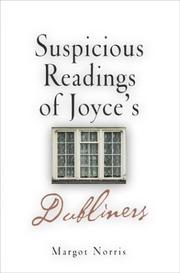| Listing 1 - 3 of 3 |
Sort by
|

ISBN: 0812237390 9780812237399 9786613211903 1283211904 0812202988 Year: 2003 Publisher: Philadelphia, Pa University of Pennsylvania Press
Abstract | Keywords | Export | Availability | Bookmark
 Loading...
Loading...Choose an application
- Reference Manager
- EndNote
- RefWorks (Direct export to RefWorks)
Because the stories in James Joyce's Dubliners seem to function as models of fiction, they are able to stand in for fiction in general in their ability to make the operation of texts explicit and visible. Joyce's stories do this by provoking skepticism in the face of their storytelling. Their narrative unreliabilities-produced by strange gaps, omitted scenes, and misleading narrative prompts-arouse suspicion and oblige the reader to distrust how and why the story is told.As a result, one is prompted to look into what is concealed, omitted, or left unspoken, a quest that often produces interpretations in conflict with what the narrative surface suggests about characters and events. Margot Norris's strategy in her analysis of the stories in Dubliners is to refuse to take the narrative voice for granted and to assume that every authorial decision to include or exclude, or to represent in a particular way, may be read as motivated. Suspicious Readings of Joyce's Dubliners examines the text for counterindictions and draws on the social context of the writing in order to offer readings from diverse theoretical perspectives.Suspicious Readings of Joyce's Dubliners devotes a chapter to each of the fifteen stories in Dubliners and shows how each confronts the reader with an interpretive challenge and an intellectual adventure. Its readings of "An Encounter," "Two Gallants," "A Painful Case," "A Mother," "The Boarding House," and "Grace" reconceive the stories in wholly novel ways-ways that reveal Joyce's writing to be even more brilliant, more exciting, and more seriously attuned to moral and political issues than we had thought.
Joyce, James --- 820 "19" JOYCE, JAMES --- Engelse literatuur--20e eeuw. Periode 1900-1999--JOYCE, JAMES --- ジョイス --- Dublin (Ireland) --- -In literature --- 820 "19" JOYCE, JAMES Engelse literatuur--20e eeuw. Periode 1900-1999--JOYCE, JAMES --- Joyce, James, --- In literature. --- Criticism and interpretation --- In literature --- Cultural Studies. --- Literature. --- LITERARY CRITICISM / European / English, Irish, Scottish, Welsh.
Book
ISBN: 9780230338715 9780230338722 Year: 2011 Volume: *1 Publisher: New York, N.Y. palgrave macmillan
Abstract | Keywords | Export | Availability | Bookmark
 Loading...
Loading...Choose an application
- Reference Manager
- EndNote
- RefWorks (Direct export to RefWorks)
Book

ISBN: 311039152X 311036302X 3110486008 9783110363029 9783110391527 9783110362909 3110362902 9783110486001 3110363038 Year: 2014 Publisher: Berlin Boston
Abstract | Keywords | Export | Availability | Bookmark
 Loading...
Loading...Choose an application
- Reference Manager
- EndNote
- RefWorks (Direct export to RefWorks)
The twenty-seven original contributions to this volume investigate the ways in which the First World War has been commemorated and represented internationally in prose fiction, drama, film, docudrama and comics from the 1960's until the present. The volume thus provides a comprehensive survey of the cultural memory of the war as reflected in various media across national cultures, addressing the complex connections between the cultural post-memory of the war and its mediation. In four sections, the essays investigate (1) the cultural legacy of the Great War (including its mythology and iconography); (2) the implications of different forms and media for representing the war; (3) 'national' memories, foregrounding the differences in post-memory representations and interpretations of the Great War, and (4) representations of the Great War within larger temporal or spatial frameworks, focusing specifically on the ideological dimensions of its 'remembrance' in historical, socio-political, gender-oriented, and post-colonial contexts.
World War, 1914-1918 --- Literature, Modern --- Collective memory and literature. --- War films --- Collective memory and motion pictures. --- Literature and the war. --- History and criticism. --- Motion pictures and the war. --- Motion pictures and collective memory --- Literature and collective memory --- Motion pictures --- Literature --- War films History and criticism --- History and criticism --- World War, 1914-1918 - Literature and the war --- Literature, Modern - 20th century - History and criticism --- Collective memory and literature --- World War, 1914-1918 - Motion pictures and the war --- War films - History and criticism --- Collective memory and motion pictures --- World War I. --- cultural memory. --- war film. --- war literature.
| Listing 1 - 3 of 3 |
Sort by
|

 Search
Search Feedback
Feedback About UniCat
About UniCat  Help
Help News
News